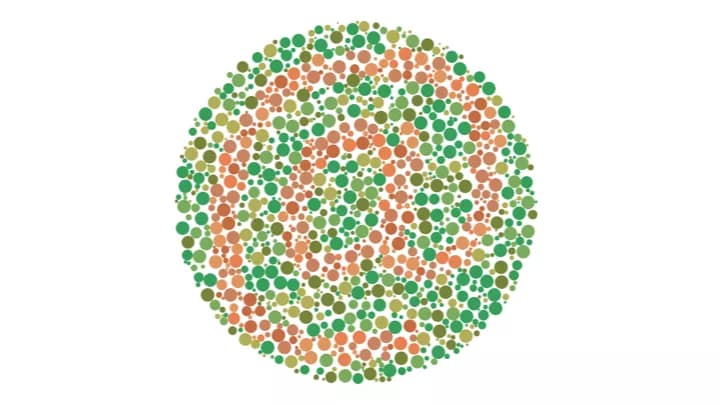What are the other Names for this Condition? (Also known as/Synonyms)
- Achromatopsia
- Color Vision Deficiency
- Monochromatopsia
What is Color Blindness? (Definition/Background Information)
- Color Blindness occurs, when there is dysfunction of the color-sensing pigments in the eye’s nerve cells. This eye defect may be acquired or inherited
- These nerve cells are called cones. Cone cells are found in the tissue that lines the back of the eye, known as the retina. The retina is light-sensitive and contains chemicals within the cone cells, to distinguish between colors. Visual information about the color is then sent through the optic nerve to the brain
- Generally, in Color Blindness, there is a difficulty in seeing red, green, blue, or a mixture of these colors, under normal light conditions
- Treatment of the condition would be dependent upon the type of Color Blindness an individual has (whether acquired or congenital); however, in most cases it is not curable
- Congenital Color Blindness has no cure; most cases of this eye disorder are inherited and hence unpreventable
Who gets Color Blindness? (Age and Sex Distribution)
- Color Blindness is most common among men of north European decent, but it can affect individuals of any race or ethnic group
- Men are most likely to be born color blind; the condition is rarely seen in women
- It is estimated that 1 out of every 10 males, has some form of Color Vision Deficiency
What are the Risk Factors for Color Blindness? (Predisposing Factors)
Risk factors associated with Color Blindness include:
- Having an eye disorder, such as glaucoma or macular degeneration
- Taking a medication called plaquenil, for arthritis
- Chronic alcoholism
- Alzheimer’s disease, Parkinson’s disease
- Certain cancers, such as leukemia
It is important to note that having a risk factor does not mean that one will get the condition. A risk factor increases ones chances of getting a condition compared to an individual without the risk factors. Some risk factors are more important than others.
Also, not having a risk factor does not mean that an individual will not get the condition. It is always important to discuss the effect of risk factors with your healthcare provider.
What are the Causes of Color Blindness? (Etiology)
Causes of Color Blindness include:
- Inherited vision problem that result in missing or dysfunctional cone receptors in the eye
- Medication side effects
- Eye injury
- Aging
- Eye disorders, such as glaucoma, cataracts, diabetic retinopathy, and macular degeneration
What are the Signs and Symptoms of Color Blindness?
The signs and symptoms of Color Blindness include:
- Ability to see some colors, but not others
- Difficulty reading
- Drooping eyelid
- Only certain shades of a color can be seen
- Seeing multiple colors
- Constantly being corrected, when naming a color
- Double vision (diplopia)
- Achromatopsia - when an individual has a black, white, and gray vision only (an extremely rare condition)
- Eye pain
How is Color Blindness Diagnosed?
Color Blindness may be diagnosed in the following manner:
- Complete physical examination with evaluation of family medical history
- Color Blindness can be diagnosed by tests that determine how well colors are recognized. This is generally done, during a routine eye exam
- The most common visual test for Color Blindness consists of a pattern made-up of multi-colored dots. Normal color vision will allow a distinction of shapes and numbers in the dots. Individuals with Color Vision Defect will not be able to distinguish the numbers, shapes, and/or colors
Many clinical conditions may have similar signs and symptoms. Your healthcare provider may perform additional tests to rule out other clinical conditions to arrive at a definitive diagnosis.
What are the possible Complications of Color Blindness?
Complications linked to Color Blindness include:
- Career limitations
- Difficulty in performing certain regular/daily tasks
- Difficulty driving, especially distinguishing between traffic light colors
How is Color Blindness Treated?
Treatment of Color Blindness depends on the type of eye defect, whether it is acquired or inherited.
- There is no cure for Congenital Color Blindness
- If the vision deficiency is due to medication, the medication may be stopped or regulated to minimize its side effects
- Special contact lenses and glasses may be used to help individuals identify the difference between similar color shades
How can Color Blindness be Prevented?
- Most cases of Color Blindness are inherited and hence, these may not be prevented
- However, early detection of the condition in children can help understand its nature and severity. This would allow the use of suitable measures to control any adverse effects and reduce learning difficulties later on
- Vision screening should be routinely performed, if taking certain medications are linked to vision deficiencies
What is the Prognosis of Color Blindness? (Outcomes/Resolutions)
Generally, Color Blindness is a life-long condition; however, the affected individuals are able to lead a normal life, only with some slight difficulties.
Additional and Relevant Useful Information for Color Blindness:
The following DoveMed website link is a useful resource for additional information:
Related Articles
Test Your Knowledge
Asked by users
Related Centers
Related Specialties
Related Physicians
Related Procedures
Related Resources
Join DoveHubs
and connect with fellow professionals


0 Comments
Please log in to post a comment.